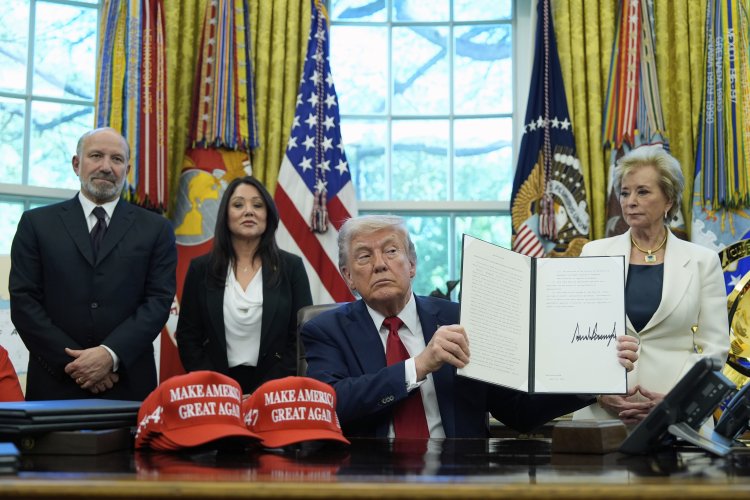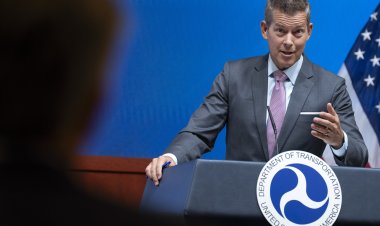Trump directs overhaul of school discipline policies, college accreditation, and funding mechanisms
Collectively, Trump's series of orders signifies impactful strategies to tighten the financial resources available to higher education institutions, while also amplifying his extensive federal involvement in the nation's education sector.

Among the executive orders he enacted on Wednesday, the ones most likely to concern college administrators include threats to withdraw federal funding from institutions that fail to disclose financial contributions from foreign entities. Additionally, he initiated an effort to eliminate diversity initiatives at universities by leveraging the independent organizations responsible for certifying their eligibility for federal funds.
Trump also called for new federal guidelines on school discipline that diverge from the policies established by his Democratic predecessors. Other directives he signed include provisions for training students in artificial intelligence, updates to federal workforce programs, and the launch of a new initiative directed at historically Black colleges and universities.
Collectively, these actions signify a substantial shift to tighten financial controls over many higher education institutions and extend his administration's already significant oversight into the education sector.
“Today’s Executive Orders pave the way for critical innovations — inviting more competition in the higher education accreditation system, ensuring transparency in college finances, supporting new technologies in the classroom, and more,” Education Secretary Linda McMahon noted in a social media statement.
Federal legislation necessitates that colleges and universities reveal gifts or contracts exceeding $250,000 from foreign sources, but enforcement of these rules has faced scrutiny and criticism, particularly from conservative lawmakers targeting the Biden administration.
Under Trump's latest directive regarding foreign funding, universities might lose certain federal grants if they do not adhere to the administration's updated disclosure requirements. This announcement carries considerable implications, particularly following the decision to freeze billions in federal grants to institutions like Columbia University and Harvard University due to their responses to pro-Palestinian protests.
The directive also instructs McMahon to reverse any policies from the previous administration that allowed higher education institutions to maintain secrecy about their foreign funding. It further requires universities to disclose the sources and intended uses of foreign contributions and encourages collaboration with Attorney General Pam Bondi and other agencies to enforce compliance through audits and investigations.
Trump's initiative to modify the college accreditation process, aimed at addressing what his administration perceives as ideological bias, is another aspect that education leaders will closely monitor.
He authorized McMahon and Bondi to suspend, oversee, or withdraw recognition from accreditors that integrate diversity, equity, and inclusion measures. The order specifically targets accreditation programs such as the American Bar Association's law school accreditation, the Liaison Committee on Medical Education, and the Accreditation Council for Graduate Medical Education.
“Federal recognition will not be provided to accreditors engaging in unlawful discrimination in violation of Federal law,” the order states.
Accreditors are independent organizations responsible for assessing educational institutions to ensure they meet established quality standards before qualifying for federal financial aid. During his 2024 presidential campaign, Trump referred to these entities as the “secret weapon” to eliminate liberal perspectives in higher education.
The accreditation order, details of which were previously reported by PMG, aims to simplify the entry process for new accreditors and mandates that institutions gather data on student outcomes to enhance results without reference to race, ethnicity, or gender. It also emphasizes the importance of “intellectual diversity” among faculty members.
This directive aligns with Trump’s previous instructions for federal agencies to “end indoctrination” in K-12 education, investigate campus protests, and implement a federal school choice initiative. Last month, he signed a long-anticipated order to begin dismantling the Department of Education.
While accreditors dispute Trump's characterization of their roles, they expressed readiness to collaborate with the administration.
“While we firmly reject President Trump’s mischaracterization of accreditors’ role in the nation’s postsecondary education system, we stand ready to work with the Secretary of Education on policies that will advance our shared mission of enhancing quality, innovation, integrity, and accountability,” stated Heather Perfetti, President of Middle States Commission on Higher Education and Chair of the Council of Regional Accrediting Commissions.
Trump's order regarding school discipline also aims to transform how schools implement policies that had previously received scrutiny during the Obama administration for disproportionately impacting students of color.
The president has mandated a report analyzing school discipline and directed his administration to propose model policies based on “American values and traditional virtues,” while also challenging the Biden administration’s civil rights officials who argued that schools must address the “continuing urgency” of racial disparities in disciplinary measures.
“Today’s executive orders make clear that despite their mantra of local control, the Trump Administration really does want to be in the business of education after all,” remarked American Federation of Teachers President Randi Weingarten. “They just want to pick and choose who they help and who they hurt, rather than build on six decades of bipartisan efforts to improve public education.”
Allen M Lee for TROIB News












